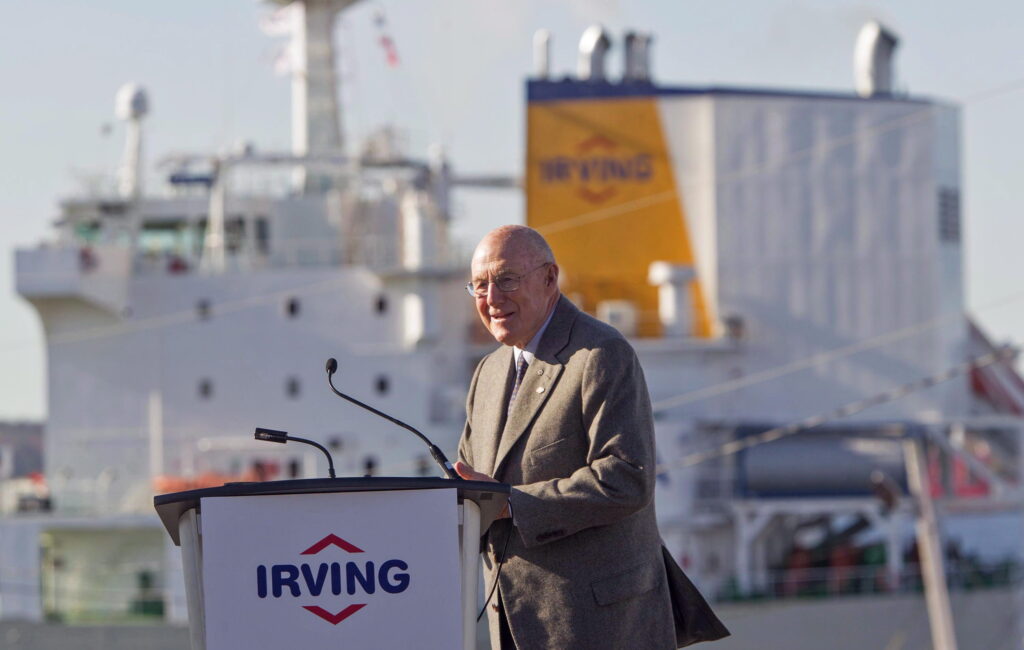Arthur L. Irving, the second son of New Brunswick businessman K.C. Irving, has died at age 93 after devoting his life to growing the oil business founded by his father.
Irving Oil said in a statement that he died Monday surrounded by his wife, Sandra, and daughter, Sarah.
Forbes magazine named Arthur Irving one of the top 10 richest Canadians for 2023. At the time of his death, Irving had an estimated net worth of $6.4 billion, which included Canada's largest refinery in Saint John, New Brunswick, and the Whitegate refinery in Ireland.
Born in 1930, Irving attended Acadia University in Nova Scotia before joining Irving Oil in 1951, where he worked alongside his father and two brothers.
“I had the choice between going to Acadia University or learning business from the best teacher I've ever known anywhere, my father,” he told author Donald Savoie in his 2020 book about Irving Oil.
“I was taught by the best teachers.”
Savoie writes that Irving's first day on the job was a happy one: “He bought a Ford, slapped the Irving diamond on the door, and went out. He got to work, meeting with existing customers, finding new ones, and beating the competition.” He became the company's president in 1972 and served as chairman emeritus until his death.
His death comes as the company's Saint John refinery is undergoing a “strategic review” to determine its future as climate change leads many countries to shift away from fossil fuels.
Although biographers have credited Irving with success in expanding the company, his life was also plagued by family troubles, including a bitter divorce from his first wife in 1980 and, more recently, an estrangement from his eldest son.
Canadian oil tycoon Arthur L. Irving dies. #NewBrunswick #Oil #Billionaire
In his 2014 book “Irving v. Irving,” journalist Jacques Poitras describes a stirring scene in August 2013, when Irving held a press conference in Saint John to announce that his company was formally opening a bidding process to build an ultimately unsuccessful pipeline to transport crude oil from Alberta to his family's refineries.
Poitras noticed the absence of his “son and successor,” Kenneth, after he left the company following disagreements in 2010. “In his octogenarian years, Arthur was surrounded by admirers yet lonely. His refineries loomed behind him… but his family was torn apart,” Poitras wrote.
Throughout the 1980s and '90s, Arthur Irving's business life and interests were closely intertwined with those of his two brothers, JK and Jack, as they were primarily responsible for various parts of the business empire their father had built: the trucking company ran on their own refined gasoline, the forestry and shipping businesses used Irving's construction subsidiaries, and the newspaper chain bought newsprint from a nearby mill.
Of the three brothers, Arthur is described by his father's biographers Douglas Howe and Ralph Costello as “the skinny, the mercurial, the most aggressive towards government and the most talkative”, but the biographers also note his ability to charm people and serve as the family's “super salesman”, chasing customers for the supertankers docked at the company's Canaport terminal outside Saint John.
In late 2009, the three Irving brothers split up, with Arthur taking over control of the energy business and setting up his own trust, which is reportedly worth around $1 billion, with quarterly dividends paid out to himself, his children, and some funds for his grandchildren.
During the 2012 legal battle, the Chief Justice of Bermuda commented that Kenneth had become estranged from his family after being removed from the company's executive ranks, a feud that Ms Poitras described as a “bitter split”.
For Savoie, a professor of public administration at the Universite de Moncton, Arthur Irving's single-mindedness has been key to the company's survival over the past 50 years.
He wrote that Irving led the company to growth at a time when other refineries around Atlantic Canada were struggling, laying off workers or closing down. “Instead of closing refineries, laying off workers and shrinking operations, the company expanded,” he said of a $1.5 billion upgrade in 2000.
“Irving Oil has grown significantly since Arthur took over in every aspect of the business, from refinery operations to sales to the number, market share and size of its retail stores.”
Atlantic Canadians and New Englanders experienced this style at Big Stop gas stations and stores, which Savoy described as “customer-centric.” He also said the author believes that while the Irving empire's businesses went in separate directions, Arthur maintained close relationships with J.K. and his brother Jack (who died in 2010).
According to Savoie's book, the three boys were encouraged to be entrepreneurs from an early age, starting out in Bouctouche, New Brunswick, selling magazine subscriptions door-to-door and buying 12 chickens to sell eggs to their neighbors. They expanded their business to 150 chickens.
“During the summer, they were expected to work in the fields and do their part just like everyone else. That means they weren't given any special treatment just because they were the sons of the Irvings.”
In a statement, the company described Irving as “an unwavering advocate for Atlantic Canada and its people” and one of a kind. “In this immeasurable loss, we know there will never be another like him again,” the company said.
This report by The Canadian Press was first published May 13, 2024.

